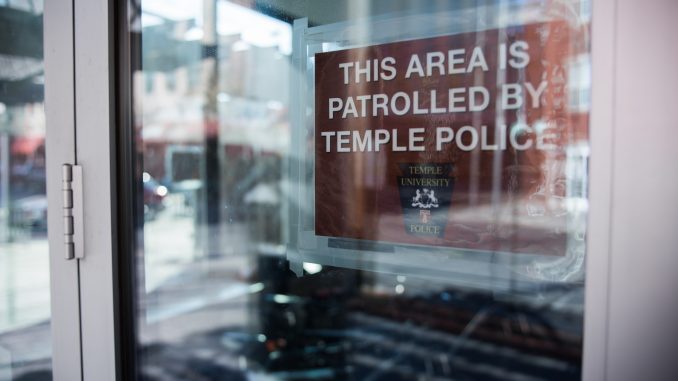
Despite a spike in the use of walking escort services, Temple Police and Allied Universal are still trying to find a way to encourage male students to use the program.
While officers said they have noticed an increase in male students’ participation, it is drastically less than the amount of female students who use the walking escort program, said Joe Garcia, the deputy chief of administration for TUPD.
According to statistics from Gene Cummings, the district manager for Allied Universal at Temple, use of walking escorts more than doubled from September to October this year.

Garcia said the increased use can be attributed to a combination of factors: night beginning earlier due to daylight saving time, students staying late on Main Campus to study for finals and the flash mob in October.
“I’ve had the opportunity to speak with a lot of parents in this last couple of weeks and a lot of it had to do with the flash mob type of incident that we had,” Garcia said. “Some [parents] have sons who attend the school and they’ve confided in their parents that they don’t want to take the escort because they’re afraid they’re going to be looked upon as weak or they think that it’s actually geared toward female students and staff.”
“It’s probably a masculinity thing,” said Taylor Robbins, a senior advertising major. “Even just not knowing about it or not thinking about it. I know it’s not the first thing I think about when I’m leaving campus. It’s just not really on my mind.”
One night in October 2015, Robbins was held at gunpoint by three men on Camac Street near Diamond, who took his money and his phone, while he walked home from the TECH Center. Police arrested two of the assailants, but despite the robbery, he said that he still has not used the walking escort service.
“It made me ride my bike a little bit more often now, but I still walk [without escorts],” Robbins said. He added that TUPD now patrols the block he had been robbed on, which makes him feel safer.
On Nov. 14, officers provided escorts nine times and only one was for a male student, Cummings said.
“Over the week, there might be a couple male students who take an escort,” he said.
“Whether it’s male or female, nobody wants to walk feeling like they’re with armed guards,” Garcia added.
He added that students can ask escorts to “shadow” them, so instead of walking right next to students, the escorts are several paces behind but still there for protection.
Joey Pace, a freshman music education major, said he used a walking escort once when he went to a friend’s house off Main Campus to get a haircut. He added that if men were harassed on the street as much as women, he thinks they would be more likely to use the escort service.
“There’s definitely that safety issue,” he said. “I’ve personally never been catcalled, but my girlfriend has been catcalled almost every day. … I’d feel more comfortable with a walking escort if I were a girl constantly getting catcalled like that.”
Garcia said most crimes against students don’t happen because of gender, but because of opportunity, so both men and women would be equally protected when they use a walking escort.
Other schools throughout the city, like the University of Pennsylvania, Drexel University and the Community College of Philadelphia, have walking escort services almost identical to the one at Temple.
Students near Main Campus can request a walking escort at 215-777-9255 any time of the day, every day of the week.
Temple’s service is not limited to Main Campus, Cummings said. Students can call a walking escort at TUCC during weekdays from 5 to 11 p.m. At the Health Sciences Campus, walking escorts are available throughout the week from 6 a.m. to 11 p.m.
Walking escort services will continue to be offered during winter break.
Julie Christie can be reached at julie.christie@temple.edu or on Twitter @ChristieJules.
Evan Easterling contributed reporting.


Be the first to comment